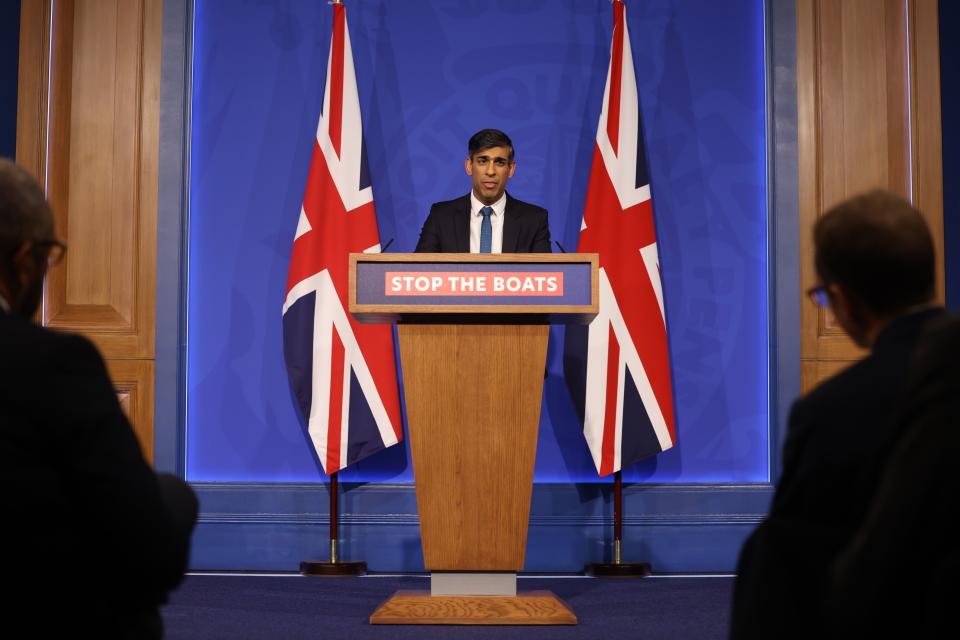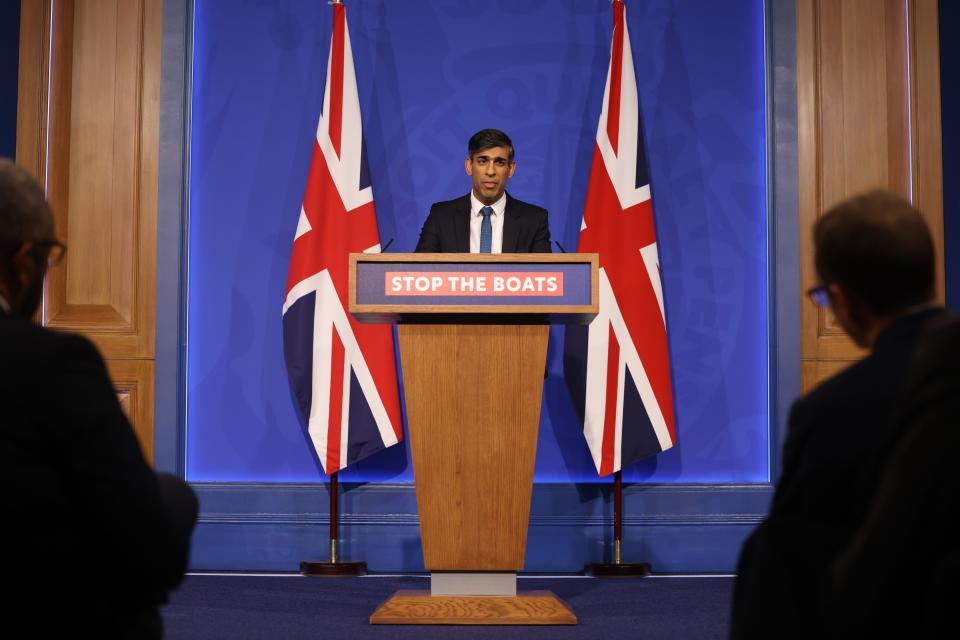Sunak Puts Rwanda Plan to Vote Next Week in Test of Power
(Bloomberg) -- Rishi Sunak won’t consider a crunch vote in Parliament on his anti-immigration bill as a question of confidence in his government, as the prime minister battles to maintain authority over a ruling Conservative Party that is fracturing again with a general election likely only months away.
Most Read from Bloomberg
Carlyle’s Rubenstein Is in Talks to Acquire Baltimore Orioles
Americans Rush to Portugal Ahead of Changes to Expat Tax Breaks
The House of Commons will hold a first vote Tuesday on legislation Sunak said will let his plan to deport asylum-seekers to Rwanda — a policy which is quickly coming to define his government — to go ahead. It poses a threat to Sunak, who is trying to stave off a rebellion from right-wing Tory MPs demanding even tougher legislation than what he is proposing. Immigration minister Robert Jenrick resigned over the plan late Wednesday, underscoring the danger.
Read more: Sunak Loses Immigration Minister Over Bid for Rwanda Compromise
At a hastily convened press conference on Thursday, a tetchy and combative Sunak — whose demeanor spoke volumes about the risks he is facing — said he wants to get the bill through Parliament in “record time,” as he tries to get Rwanda flights in the air before the UK vote, due by January 2025 at the latest.
But the government won’t regard it as a confidence matter for Tory MPs, an official said. That is an important distinction because if the prime minister whipped his lawmakers to vote with the government and still lost, he’d likely to be told by opponents to resign or seek an election. Given the Rwanda plan is a totemic issue for the Conservative Party, the fact Sunak appeared to try to lower the stakes points to just how restless Tory MPs currently are.
Instead, Sunak tried to reach out to the right-wing of the party most likely to rebel. “For the people who say you should do something different,” he said, “the difference between them and me isn’t much given everything that we have closed we’re talking about an inch. But that inch, by the way, is the difference between the Rwandans participating in this.”
Still, Sunak can’t avoid the significance of what happens on his Rwanda plan, according to Sophie Stowers from the UK in a Changing Europe think tank.
“If he loses that vote he’s going to face up to the fact that he needs to choose between one wing of his party or the other,” she said. “This will be crunch time and will decide the direction his election campaign and the rest of his leadership will go in.” It would also bring forward the election, she predicted.
Jenrick’s departure was a major blow to the prime minister, because it laid bare the schism in the Tory party between the more strident voices on the right calling for the government to disregard the UK’s domestic and international human rights obligations when it comes to asylum cases, and more moderate MPs demanding ministers adhere to the law in full.
What Jenrick and others including former Home Secretary Suella Braverman, who was ousted last month, have called for is legislation to prevent asylum-seekers from arguing their cases in court. Their argument is that only such a hardline approach would enable deportation flights to take off and deter asylum-seekers from arriving across the English Channel in small boats.
“This is a very litigious field and there are lots of legal frameworks that apply,” Braverman told BBC radio. “The reality is — and the sorry truth — is that it won’t work and it will not stop the boats.”
On Thursday, Sunak appeared hellbent on persuading right-wing MPs he’s on their side, saying the legislation effectively “blocks every single reason that has ever been used” to stop the Rwanda deportation flights. The proposed law dis-applies swathes of UK human rights law, he said.
He appointed Michael Tomlinson, who was Solicitor General, to a new position as Minister for Illegal Migration in a reshuffle to replace Jenrick.
But right-wing MPs are not the only caucus Sunak has to worry about. Though the Conservative Party has moved significantly to the right after Brexit, a significant rump of MPs oppose any legislation that would see the UK violate its international obligations.
“If there’s any prospect of any British bill or act of Parliament bypassing international law, then I will not support it.” Tory MP Tobias Ellwood told Times Radio. “We were the ones that crafted most of the laws, international laws after the Second World War. We uphold international law. We don’t break it.”
It means Sunak faces a dangerous few days as he tries to get MPs onside. Compounding the challenge, he is due to testify Monday at the official Covid-19 inquiry about his controversial role in the government’s pandemic response.
The legislation is part of a two-pronged approach to implement the Rwanda deportation plan, which since it was announced by former Prime Minister Boris Johnson in 2022, has been repeatedly held up by European and UK courts, culminating in its rejection last month as “unlawful” by the Supreme Court.
The first part of the strategy was completed Tuesday, when Home Secretary James Cleverly signed a treaty with Rwanda providing guarantees deportees wouldn’t be forcibly returned to their home countries.
Conservative strategists see implementing the Rwanda program as vital to win back voters at the election. The Tories trail the opposition Labour Party by 20 points in polls, and Sunak also faces a challenge from the anti-immigration Reform UK party co-founded by Brexit champion Nigel Farage.
(Updates with analyst comment in sixth paragraph, details throughout.)
Most Read from Bloomberg Businessweek
Salesforce Signals the Golden Age of Cushy Tech Jobs Is Over
How the Biggest Boutique Fitness Company Turned Suburban Moms Into Bankrupt Franchisees
Hottest Job in US Pays $80,000 a Year, No College Degree Needed
At World Central Kitchen, José Andrés Is in the Middle of a Mess
SpaceX’s Colossal Starship Sets Pace in Race to Build Larger Rockets
©2023 Bloomberg L.P.

 Yahoo News
Yahoo News 



